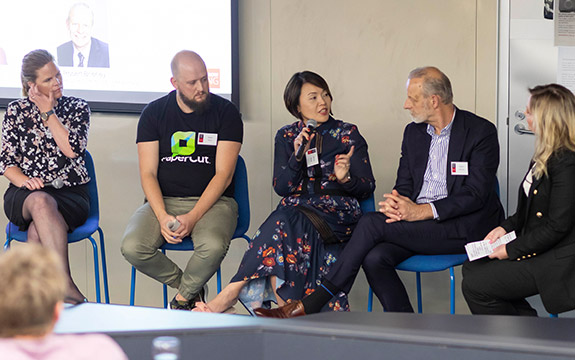How HR professionals can help organisations thrive

In Summary
- Human resource professionals should be data-driven, people-focused, tech-savvy and embrace flexible working to help their organisations thrive
- A panel or HR experts has provided insights into the role of HR professionals at the launch of Swinburne’s refreshed Master of Human Resource Management
- The Master of Human Resource Management has been co-developed with Swinburne’s partners Siemens and Medibank
Human resource (HR) professionals need to be data-driven, people-focused and tech-savvy in the rapidly transforming world of work, four industry experts have said at the launch of Swinburne’s refreshed Master of Human Resource Management.
Deloitte Access Economics forecasts the demand for human resource professionals will grow by almost 8,000 people over the next five years to 2023 – an annual growth rate of 2.5 per cent.
The HR professionals from Medibank, PaperCut, Siemens and PACCAR Australia shared insights into how HR leaders can help their organisations thrive.
Data-informed decisions
Using data analytics and metrics is now a core competency in HR, says Robert Brierley formerly from PACCAR Australia, a global leader in the design and manufacture of trucks.
“If you’re going to come up with a new HR initiative, you need to be able to justify it with the numbers and make a case for why there is a business need. It is no different in that way to other business operations like marketing or IT.”
Data can also show employee sentiment that in turn can be used to shape a better employee experience, which General Manager of People and Culture for the private health insurer Medibank, Melissa Wong, says is a key role of HR.
“Using data we can look at things like what time someone swipes in to what time they are sending emails at night…through the staff intranet system you can then actively push out content about resilience or health and wellbeing…that’s the potential we have in terms of the metrics to improve the employee experience.”
Swinburne Adjunct Professor and HR professional, Gaynor Witts, says some organisations are using data to inform employee retention strategies.
“I’ve seen one company use data to see that somewhere between year three and four of employment there was a drop off, whereas if an employee stayed five years they would likely stay much longer.”
“As a result of having that information they were able to target a development program for people in year three and four and saw really quickly that the drop-off rate significantly decreased.”
People-first approach
Relational abilities and influential skills are some of the key attributes HR professionals should have, says Ms Wong from Medibank.
“One of the most important things we can do is have our ear to the ground and understand the dynamics of the workplace…because quite often people come to us for counsel and advice about other people,” she says.
“The ability to build rapport is also important so people know to come to you when things happen…then to be able to have influential conversations after that is critically important.”
Embracing flexible working
Adam Axon from PaperCut says technology enables his organisation to support remote workers.
PaperCut is a print management software startup that has grown to 200 employees across three offices, with many employees working remotely.
“We use technology to make sure if someone is remote that they are ‘always on’, we have a screen in the office to hook up a permanent video link and we have good microphones set up so that when our team are collaborating they can chime into the conversations.”
He says it is vital to make remote workers feel like a valued part of the team, which can be shown in small ways.
“When we have an office party we always have donuts… for our people who work remotely, we send them a donut voucher at the start of the year to help them feel included.”
The HR experts agree that organisations should not try to roll out a ‘one size fits all’ approach.
“Flexible working has to be tailored to the individual’s needs…there should be guidelines as opposed to rules,” says Ms Wong.
Mr Axon says people’s experiences differ depending on where they are located.
“If you strive for too much consistency you might lose something special. Create frameworks rather than policies and allow for people to have scope within those bounds.”
Swinburne and Human Resource Management
The Master of Human Resource Management at Swinburne has been co-developed and is co-delivered with leading industry partners to equip and upskill students in the latest HR theory and practice. It is part of Swinburne's Australian Graduate School of Entrepreneurship (AGSE).

